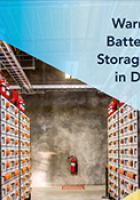Publications
Warranties for Battery Energy Storage Systems (BESS) provide mechanisms for buyers and investors to mitigate the technical and operational risks of battery projects, by transferring the risk of defects or performance issues to the manufacturer or the battery vendor. New battery technologies have valuable attributes that are well suited to the needs of developing countries. However, their limited track record can hamper its widespread deployment.
Conditions found in some developing countries may present extra challenges as BESS need to operate in harsh climate conditions, remote locations with poor accessibility, limited internet access, low availability of skilled local workforce, and unreliable power supply. These conditions render the underlying need for flexible operation even more acute.
This report describes good practices for BESS warranty design including: tailoring BESS warranties to applications in developing countries (offering flexibility of operation); making terms and conditions of BESS warranties clear and easy to implement (clearly define realistic environmental and operational limits that can void the warranty under local conditions of temperature and humidity); and planning for the correct operation and maintenance of the BESS to ensure that the warranty remains valid.
The report benefitted from invaluable input from: Adam Tuck (NRC Canada), Norman Jackson (South African Energy Storage Association), Ulrich Bohnert (Munich Re), Manuel Jose Millan (Senior Engineer, WB), and Jiawei Song (Consultant, WB).
Warranties for Battery Energy Storage Systems in Developing Countries (English). Washington, D.C.: World Bank Group. http://documents.worldbank.org/curated/en/339531600374280939/Warranties-for-Battery-Energy-Storage-Systems-in-Developing-Countries




